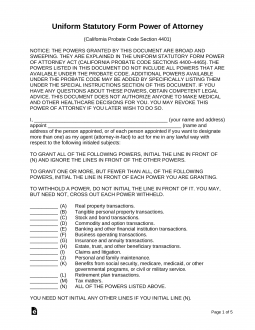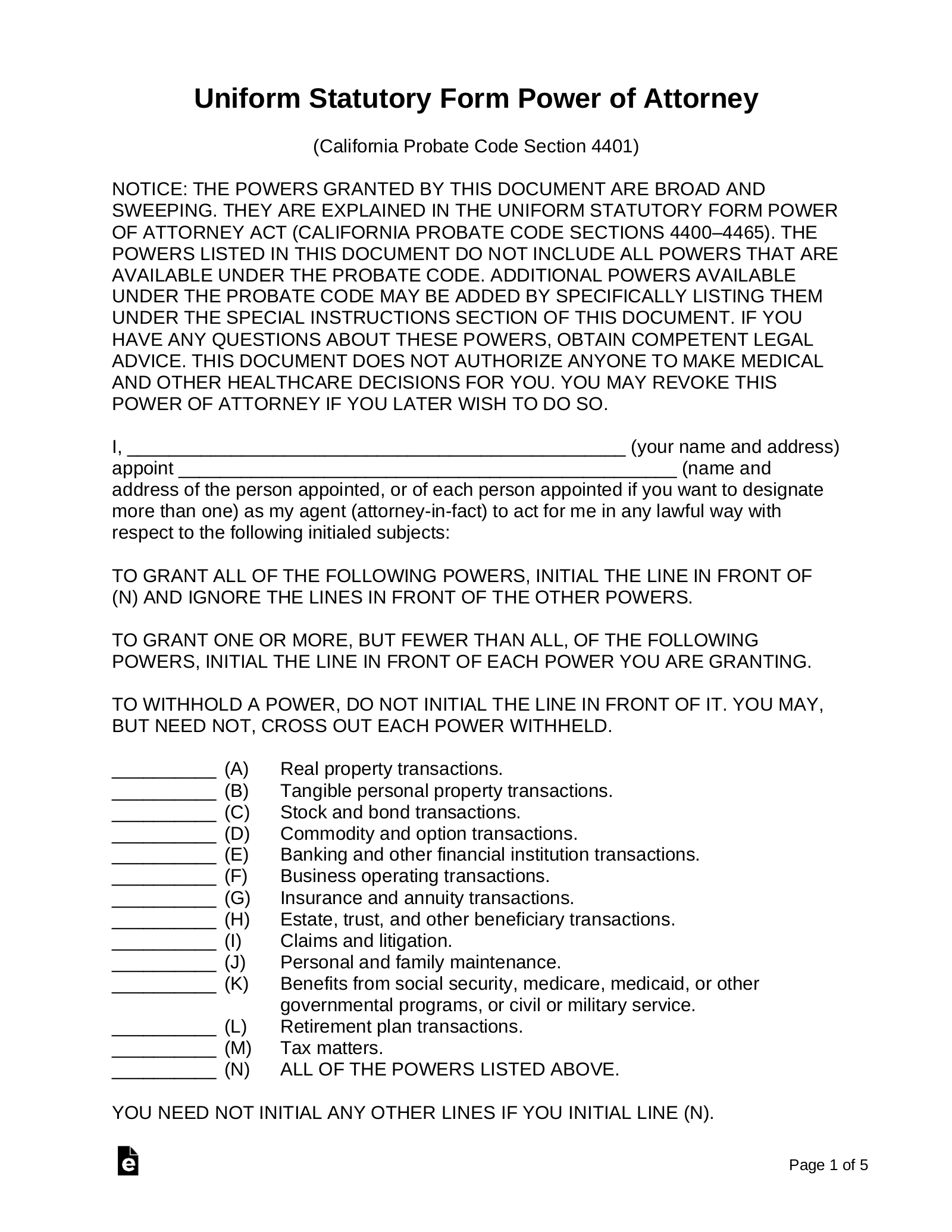Updated April 16, 2024
A California power of attorney can be used to grant certain powers to a trusted friend or relative in the event the person granting the powers, or principal, is unable or unavailable to act when required. The person acting on behalf of the principal, otherwise known as the agent, is expected to make all decisions in the best interest of the principal. The document can specify broad or narrow powers. Additionally, it can be tailored to be in effect for a long period of time or a short period of time.
By Type (9) |
 Advance Health Care Directive – Allows a person to select a health care agent (medical power of attorney) and set out their end-of-life treatment options (living will). Advance Health Care Directive – Allows a person to select a health care agent (medical power of attorney) and set out their end-of-life treatment options (living will).
Download: PDF Signing Requirements (§ 4701): Two (2) witnesses or a notary acknowledgment. |
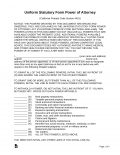 Durable (Statutory) Power of Attorney – Allows someone else to handle financial decisions while they are coherent and if they should become incapacitated. Durable (Statutory) Power of Attorney – Allows someone else to handle financial decisions while they are coherent and if they should become incapacitated.
Download: PDF, MS Word, OpenDocument Signing Requirements (§ 4402(c)): A notary acknowledgment. |
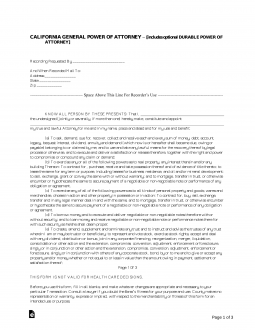 General Power of Attorney – Allows an individual to give certain financial powers to someone else while they are coherent. If they should become incapacitated, the form becomes void. General Power of Attorney – Allows an individual to give certain financial powers to someone else while they are coherent. If they should become incapacitated, the form becomes void.
Download: PDF, MS Word, OpenDocument Signing Requirements (§ 4121(c)): Two (2) witnesses or a notary acknowledgment. |
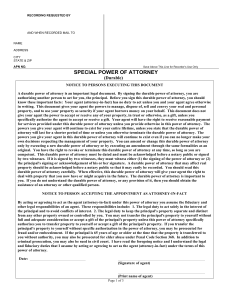 Limited Power of Attorney – This form is meant to take into account certain limited situations where a principal needs to have an agent act for him or her. Limited Power of Attorney – This form is meant to take into account certain limited situations where a principal needs to have an agent act for him or her.
Download: PDF, MS Word, OpenDocument Signing Requirements (§ 4121(c)): Two (2) witnesses or a notary acknowledgment. |
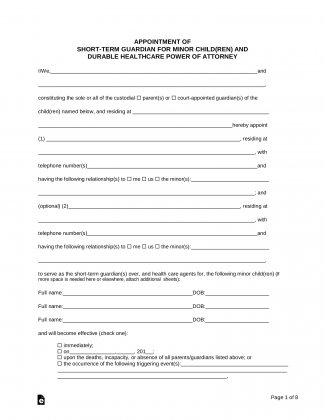 Parental (Minor Children) Power of Attorney – This form permits a parent to grant the power to a temporary guardian to make decisions on behalf of their children in case the parent has to be away from the children for a period of time and therefore unable to make everyday decisions for them. Parental (Minor Children) Power of Attorney – This form permits a parent to grant the power to a temporary guardian to make decisions on behalf of their children in case the parent has to be away from the children for a period of time and therefore unable to make everyday decisions for them.
Download: PDF, MS Word, OpenDocument |
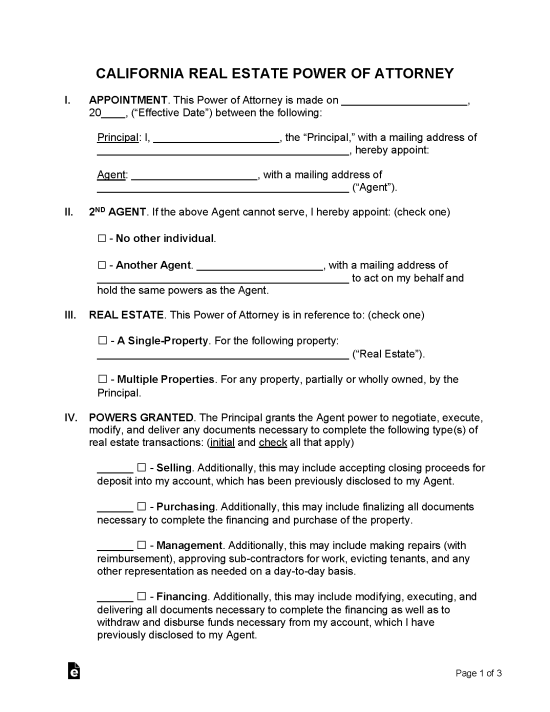 Real Estate Power of Attorney – For the sale, management, or purchasing of real property on behalf of someone else. Real Estate Power of Attorney – For the sale, management, or purchasing of real property on behalf of someone else.
Download: PDF, MS Word, OpenDocument Signing Requirements (§ 4121(c)): Two (2) witnesses or a notary acknowledgment. |
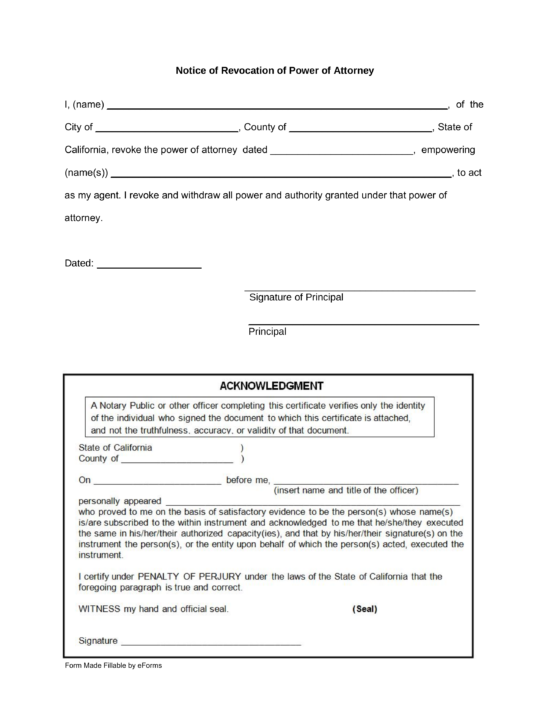 Revocation of Power of Attorney – This form is used when a person of sound mind seeks to revoke a power of attorney they may have created in the past. Revocation of Power of Attorney – This form is used when a person of sound mind seeks to revoke a power of attorney they may have created in the past.
Download: PDF
|
 Tax Power of Attorney (FTB 3520) – This form is used when a person seeks to have someone else represent them in matters involving the California Tax Service Center. Tax Power of Attorney (FTB 3520) – This form is used when a person seeks to have someone else represent them in matters involving the California Tax Service Center.
Download: PDF Signing Requirements: The principal only. |
 Vehicle Power of Attorney (REG 260) – This form is helpful in the event someone needs to have a representative handle matters with the California Department of Motor Vehicles. Vehicle Power of Attorney (REG 260) – This form is helpful in the event someone needs to have a representative handle matters with the California Department of Motor Vehicles.
Download: PDF Signing Requirements: The principal only. |

